Month 8:15, Week 2:7 (Shibi'i/Sukkot), Year:Day 5949:221 AM
2Exodus 6/40
Gregorian Calendar: Sunday 13 October 2019
New Testament Studies
The Complete Messianic Evangelical
New Testament Phronema Study Series
5. The Galilean Ministry Starts (Mark 1:14-20)
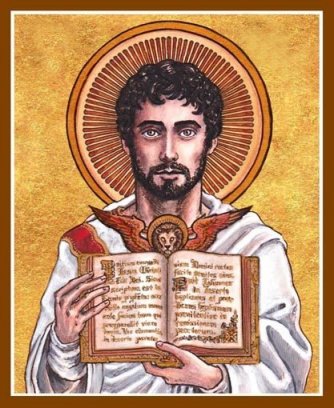
Continued from Part 4 (Mark 1:9-13)
Introduction
Shabbat shalom and welcome to the fifth part of this New Testament Phronemic Study Series. Last week we completed the second part of what I call the 'curtain raiser' that introduced Mark's Gospel in which we covered Yah'shua's (Jesus') baptism and His temptation in the wilderness among the wild beasts. Mid-week I also made an ex tempore video (so there's no written text with it) simply called 'The Gospel of Mark' (BWS001a & BWS001b) in which I informally shared some of my experiences in making this series and how I have arrived at a number of conclusions. I'll make other videos like this which I am calling 'Bible Worskshops' which I hope will help you understand where I'm coming from.
Witnessing Tools for the Post-Modern Generation
Can I also remind you that one of the purposes of this Bible Series is to equip missionaries, particularly our witness to unbelievers who have been raised in a post-modernist mindset. Every age in which the Besorah (Gospel) is preached must address the problems peculiar to that age and Yah knows there are plenty of new problems in our day! People from my generation have an understandable tendency to base their assumptions about society on their own growing-up experience, which is fine for those from my generation, but the Enemy is hard at work on the young generation too and planting ever new and destructive ideas all the time. We have to stay ahead of this invasion of the mind ready to cut it off with emet (truth).
Dealing With Contemporary Orwellian Newspeak
This makes for a lot of extra but necessary work because we can no longer rely on old assumptions. This is an age of what one might call 'deconstruction' of the very thinking processes themselves where facts are becoming increasingly less and less important. So one of our first orders of business is to show people that ours is a rational world requiring the use and application of reason. If we don't do that we will be forced to increasingly rely on emotions and feelings in defence of emet (truth) and you all know how fickle and unreliable they can be. Having done that, we are then obliged to carefully define our terms, because in this world of Orwellian Newspeak we are increasingly inhabiting, everything is being redefined to mean something else. That goes for religious terms too.
Defining Basic Christian Words
Now there are a lot of new words replete with theological meaning in the 'stage-setting' verses of 1-13 in chapter 1 that we have covered in the last two sessions. There's nothing mysterious about them to you and I because they are a part of our common ecclesiastical vocabulary in which most of you were raised. But for those anciently not having a Judahite background these would have been unfamiliar terms requiring careful explanation just as they are becoming increasingly unfamiliar to the post-modern generation. In our post-Christian western world where exposure to Christianity is now minimal, more so here in Europe than in the USA, where these words have acquired fresh, unbiblical meanings owing to false stereotyping by secularists and anti-Christians alike, we have a real problem. Even new converts don't always get taught accurately and secular dictionaries aren't always helpful. Could you define these terms for someone investigating the Besorah (Gospel)? If not, then we have work to do. About the only assumption you can resonably make now is that most Western people don't accurately know what these terms mean.
Twelve Introductory Terms
So in a mere 13 verses we are actually exposed to at least a dozen religious terms which unbelievers and those generally illiterate in Christianity and in the Bible will need carefully explaining to them. What I'd like to invite you to do afterwards, privately or in groups, is to attempt to make concise definitions of your own and check them them up to see if they are biblically and theologically correct. So, this is the 'new' vocabularly:

- 1. Elohim, Yahweh (YHWH) or 'God';
- 2. Besorah or 'Gospel', 'Good News';
- 3. Navi or 'prophet';
- 4. Sin;
- 5. Forgiveness;
- 6. Baptism or Immersion;
- 7. Teshuvah or Repentance;
- 8. Ruach haQodesh, Holy Spirit or Holy Ghost;
- 9. Heaven and heavens (distinguish between sky and spirit world);
- 10. Emunah or Faith;
- 11. HaSatan, the Adversary or Satan; and
- 12. Malakim or Angels
Learning Promised Land Geography
You also need to know a little about the geography of the Holy Land - where the River Jordan is, what Israel and Judah are (why they are, and aren't, the same), where Nazareth and Galilee are, etc., so then there are some other things new seekers are going to have to learn about. Every witness has to be a teacher of sorts. Teaching then becomes an essential part of discipleship.
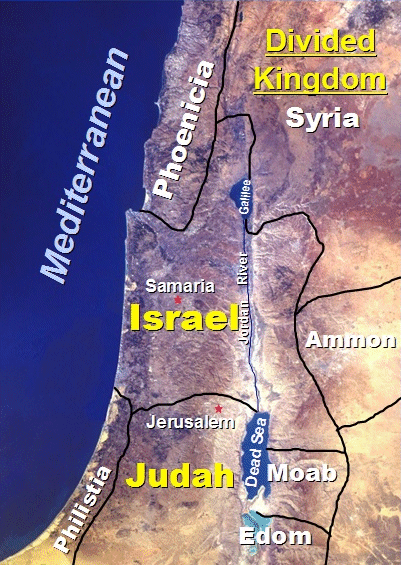
The Basic Story
But for now we don't need to go into any sort of detail. We'll unpack these words more later. Right now it's the main story theme that's the most important thing, the story about Yah'shua the Messiah (Jesus Christ) and for the moment the central character announcing Him, John the Baptist. But if you're going to use the Gospel of Mark to witness, be sure to ask your investigators whether they have understood everything that you've read to them in these first 13 verses. There's a lot of theology implied in the terms used in them.
That Essential Initial Connection
More important, though, is that your listeners are enabled to enter into the story - the drama, into the phronema, into the flow and motion, and are connecting to the invisible power that is the Ruach haQodesh (Holy Spirit). Remember, that the majority of first believers were illiterate and what they learned and retained, they did through hearing and not reading. Thoughts, emotions and spiritual impressions will all co-mingle to begin with, and that's probably as well. The most important thing, after 13 verses, is that you have a living encounter with Elohim (God) and know that He loves you as your Heavenly Father. Something about the importance of deep personal relationships should be stirred and a desire to know the Creator as the Heavenly Father became known in that special way to Yah'shua (Jesus) at His baptism.
The Parts Mark Leaves Out
We now come to today's text which starts at Mark 1:14. The curtain is up, we've been introduced to the anavi (prophet) John the Baptist and his message or repentance and baptism, and then at Yah'shua's (Jesus) baptism we are confronted with the Creator of the Universe breaking dramatically forth out of the heavens after 450 years of silence and announcing approval and love of His Son. John Mark, whose narrative is like an ever accelerating train, bypasses - and has already bypassed - huge chunks of history covered by Matthew and Luke. He doesn't talk about:
- 1. The Annunciation to Zacharias (Lk.1:5-25);
- 2. The Annunciation to Mary (Lk.1:26-38);
- 3. The visit of Mary to Elizabeth (Lk.1:39-55);
- 4. The Birth of John the Baptist (Lk.1:57-64);
- 5. The Prophecy of Zachariah (Lk.1:67-69);
- 6. The Return of Marz to Nazaerth (Lk.1:56);
- 7. The Annunication to Joseph (Mt.1:18-25a);
- 8. The Birth of Messiah (Lk.2:1-7);
- 9. The Witness and Proclamation of the Shepherds (Lk.2:8-20);
- 10. The Circumcision and Naming of Messiah (Lk.2:21);
- 11. The Genealogies of Messiah (Mt.1:1-17; Lk.3:23b-38);
- 12. Messiah Presented at the Temple (Lk.2:22-39a);
- 13. Visit of the Wise Men (Mt.2:1-12);
- 14. The Flight into Egypt (Mt.2:13-18);
- 15. The Return from Egypt to Nazareth (Mt.2:19-23; Lk.2:39b);
- 16. The Childhood of Messiah (Lk.2:40);
- 17. Messiah at the Temple, Age 12 (Lk.2:41-45);
- 18. The Young Manhood of Messiah (Lk.2:52);
- 19. Preparation of John the Baptist (Lk.1:80); and
- 20. Time and Background of John's Ministry (Lk.3:1-2).

All of these Mark omits, for the reasons we have already discussed in outline, because they are not germaine to the purpose of this Gospel! Not until we come to John and his message of repentance (Mt.3:1-12; Mk.1:2-8; Lk.3:3-18), John's baptism of Yah'shua (Jesus) (Mt.3:13-17; Mk.1:9-11; Lk.3:21-23a) and the Fast and Temptation of Yah'shua (Jesus) in the Wilderness (Mt.4:1-11; Mk.1:12-13; Lk.4:1-13) do all three Synoptists (Matthew, Mark and Luke) start talking about the same things. But even then, Matthew and Luke go into far more detail than Mark.
Other Omissions
Lots of other things happen which Mark also skips:
- 21. Messiah's Attendance at Passover and the Cleansing of the Temple (Jn.2:13-25);
- 22. Messiah's Instruction of Nicodemus (Jn.3:1-21); and
- 23. John the Baptist Further Testifies of Messiah (Jn.3:22-36).
Herod, Herodias and John's Arrest
And then, on one of the few occasions Mark breaks with chronology (only Luke maintains a perfect chronology and is therefore the standard in that respect), do we have to hop to chapter 6, and verses 17-20, so we'll do that now and then resume where we left off last week:
"What has happened was this. Herod had married Herodias, his brother Philip's wife. John regularly told Herod it wasn't right for him to take his brother's wife; so Herod arrested him and tied him up in prison. Herodias kept up a grudge against him and wanted to kill him, but couldn't. Herod was afraid of John, knowing that he was a just and qadosh (holy, set-apart) man. So he protected him, and used to listen to him regularly. What he heard disturbed him greatly, and yet he enjoyed listening to him" (Mk.6:17-20, KNT).
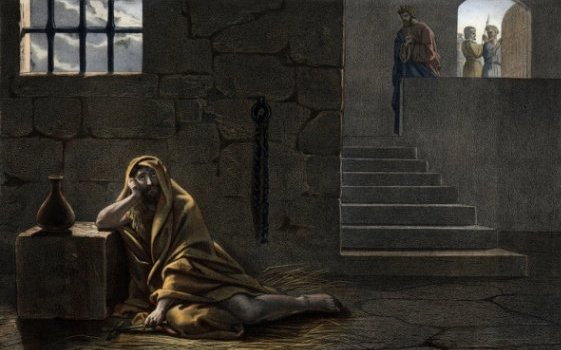 Herod would regularly visit John whom he had imprisoned to hear him preach
Herod would regularly visit John whom he had imprisoned to hear him preach
The Curtain Rises for Act 2
We'll discuss that more fully when we get to chapter 16. I have inserted it here as it links chronologically with our main text today. So let's plunge into the next Scene of Mark's Drama. The curtain falls on Yah'shua (Jesus) in the Widlerness of Judea and now rises for Act 2 in Galilee which all four Gospel writers announce (Mt.4:12; Mk.1:14; Lk.4:14; Jn.1-3). Before Mark gets into his details of the beginning of the Galillean ministry, other things happen, or are happening, which he doesn't mention either:
- 24. The Samartitan at Jacob's Well (Jn.4:4-42);
- 25. Details of the Entry into Galilee (Lk.4:15; Jn.4:43-45);
- 26. Messiah heals the Nobleman's Son (Jn.4:46-54); and
- 27. Messiah rejected at Nazareth (Lk.4:16-30).
Mark 1:14-20
Then He goes to Capernaum (Mt.4:13-17; Mk.1:15) and it is here, we presume, that Mark plunges into the Galilean ministry. So let's open up at Mark 1:14 and read to verse 20 (NKJV Evidence Bible/EB, p.1387):
"After John's arrest, Yah'shua (Jesus) came into Galilee, announcing Elohim's (God's) good news (Besorah, Gospel). 'The time is fulfilled! He said; 'Elohim's (God's) Kingdom is arriving! Turn back ('Repent' - NKJV), and believe the good news (gospel)!'
"As He went along beside the Sea of Galilee He saw Simon (Peter) and his brother Andrew. They were fishermen, and were casting nets into the sea. 'Follow Me!' said Yah'shua (Jesus). 'I'll have you fishing for people! ('I will make you fishers of men!' - NKJV)'
"Straight away they left their nets and followed Him. He went on a bit, and saw James, Zebedee's son, and John his brother. They were in the boat mending ('preparing' - NKJV) their nets, and He called them then and there. They left their father Zebedee in the boat with the servants ('hired men' - NKJV), and went off ('followed' - NKJV) after Him" (Mk.1:14-20, KNT; cp. Mt.4:18-22; Lk.5:1-11).
The Absent Miracle of the Fishes
So, right off the bat in Mark's account, things are now getting radical for the first talmidim (disciples) - and by that, I mean, they had to make radical, life-changing choices! This was to be no arm-chair religion. Notice that Mark does not mention the miracle of the huge catch of fish that nearly sank the boat when they brought it on board following Yah'shua's (Jesus') instruction. This account is found in Luke's Gospel, but then like Mark, Matthew doesn't mention it either. We'll talk about then when we come to Luke. What you've got to ask yourself is why Mark focuses on what he does, remembering his Roman audience and purpose, which is to convert unbelievers with no background in the Tanakh (Old Testament) whatsoever. To what does Mark, and by proxy, Peter, want us to respond? I have always found this account amazing, for as long as I can remember. You see, this Act in the Drama isn't about miraculous catches of fishes, or even about what that represents synbolically - namely, future successful evangelism. This is about making a radical choice to follow or not in response to the Father's approbation of the Son in the Jordan Scene.
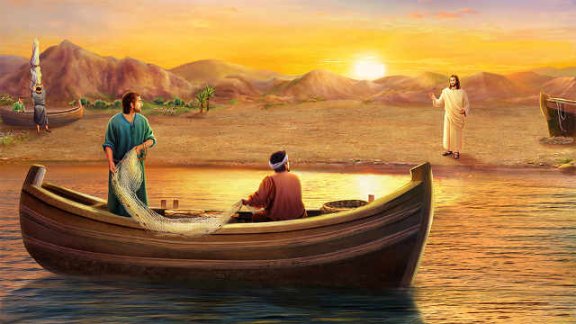 The first disciples are called to drop everything and follow Yah'shua
The first disciples are called to drop everything and follow Yah'shua
Family Businesses Over Centuries
Picture the scene. Now we have no idea for how many generations the Zebedee family had been fishing on the Sea of Galilee, but I'm guessing it was a lot more than four. Back then was not like it is today. In that country and culture, as is still true in many countries and cultures today, a small family business can be handed on not only through generations but literally for centuries. My father followed in his father's footsteps as an architect; and before my grandfather, my great-grandfather was an artist and his father was a stonemason. It was expected that I would be an architect too, and though I was interested, my calling was in teaching and ministry, which I chose.
Safety and Security in a Generational Trade
For the first century Yehudi (Judahite), carrying on the same trade, generation after generation, gave safety and security. Those fishermen must have known every inch of the Sea of Galilee, and everything there was to know about the business of fishing and about the weather in every season on that lake. They knew exactly what they were doing acquired from the previous generations which had passed on their accumulated wisdom. And if times were hard, they just worked a bit harder. They knew you had to be persistent and sometimes they would fish all night.
Peter's Defining Moment
Then, out of the blue, this young navi (prophet) from Nazareth, around 30-31 years old, tells these men to drop everything and follow Him there and then. Why is Mark so keen to emphasise this moment at the expense of so much other history that included miracles? Remember that Simon, later to be called 'Peter', was there, the one furnishing John Mark with his story, and for the apostle this was the defining moment of his life. This was when everything changed for him. He is also the chief apostle of the Messianic Community (Church) so this is his tale.
An Echo From the Past
So taking all these elements together, what then is this action by the Sea of Galilee supposed to remind us of? What is this an echo of from the past - of having to suddenly drop an ancient business, 'just like that' - and head off into the unknown with a Man whose only commendation was the natural authority and Ruach (Spirit) which He bore? Had Peter, Andrew, James and John known of the incredible events at the River Jordan? Had they met Him before? We're not told and by all accounts this was their first meeting. The fact that John Mark includes this event in his narrative suggests that they, or at least Peter, had at least heard about Him. So what in this calling is an echo of the past? Consider these words that likewise spoke out of heaven to an ancient patriarch:
"Get out of your country,
From your family
And from your father's house,
To a land that I will show you.
I will make you a great nation;
I will bless you and make your name great;
And you shall be a blessing.
I will bless those who bless you,
And I will curse him who curses you;
And in you all the families of the earth shall be blessed"
(Gen.12:1-3, NKJV; EB, p.22).
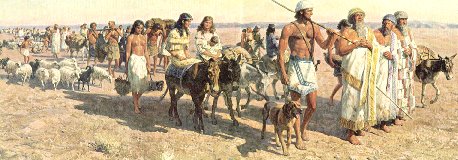 Abraham leaving with his family for an unknown country at Yahweh's command
Abraham leaving with his family for an unknown country at Yahweh's command
The Travels of Yahweh's Pioneers
Yes, indeed, Abraham, who was likewise suddenly called to uproot himself and his family and move to goodness-knows-where. Notice Yahweh didn't give Abraham his destination. He just said, pack your bags, follow my Voice, and trust Me! This is a recurring tavnith or pattern that all Yahweh's great pioneers must imitate and get used to. The 12 apostles, of which these were ther first 4, were no exception. We too must do what we are told and go where we are bidden. It's how I happen to be in Scandinavia. My first wife abandoned me with our two children and went west, and Yahweh gave me a vision and told me to go east to Norway! Nearly 10 years later He told me to sell my home and, taking my family, go east again, this time to Sweden. I did not know until 3 days before we had to move where we were going! And it wouldn't surprise me if He suddenly tells me to move again one day.
The Kingdom of Elohim
This is the same kind of calling being given to the first talmidim (disciples). And on an even greater scale Mark is telling us that the 'old family business' of the people of Elohim (God) - their Priesthood system, temple, and animal sacrifices - is being left behind for something new and better - and is to be told and written down to become eventual Scripture as a new Poem, a new Drama, a new Epic, a new Story every bit as great as the one that began when Abraham packed his bags and left Ur of the Chaldees. This Poem, Drama, Epic, or Story has a name which we will encounter again and again in the Messianic Scriptures (New Testament): it is called the Kingdom of Elohim (God), the Malkut Elohim (OJB) or Malkut Yahweh (RSTNE) in Hebrew, or as some messianic translations call it, the Reign of Elohim (God) (ISRV) or the Dominion of Elohim (God) (HRV), which we are to seek diligently above all else (Mt.6:33).
Not a New Political Kingdom
This is what all the House of Israel - kol beit Yisra'el - had been awaiting but - and it's a really big 'but', as we shall see - it was not to be a new political kingdom to displace that of the Roman one. It wasn't even a new kind of spirituality but because no radical change of lifestyle was about to be mandated - it was the same Torah code of morality and ethics only of a much more complete kind, on a higher spiritual plane. There was much, indeed, that would be new and unfamiliar about it and yet had the ancient nevi'im (prophets) and patriarchs encountered it there and then, they would have recognised much about it already, much of it having been substantially lost over the millennia, and especially over that 450 period of 'silence' from Malachi to Matthew.
The Kingdom as Good and Bad News
The Kingdom that Yah'shua (Jesus) was announcing was the exceeingly good (but also dangerous) news that the living Elohim (God) was on the move again, was coming into His Kingdom, and that it would be up to them to fall in behind it, as it were, so as not to be left behind. This Kingdom demanded of those called into it a definite response because it would inevitably provoke a backlash from the rulers of this world, as every powerful manifestation of this Kingdom does. Why? Because Yahweh's 'Good News' is only good news for the repentant - it is exceedingly bad news for the wicked determined to continue sinning.
Defining the 'Good News'
At the beginning of today's lesson I gave you a list of 12 theological terms mentioned in the opening verses of the Gospel of Mark which you would would need to be able to define to an unbeliever totally unacquainted with the Scriptures, and what were going to do now is pause to define one of them - a critical one - which we are going to encounter again and again throughout the Messianic Scriptures (New Testament) which if we get wrong is going to distort our whole perception and understanding. It's a word that can be said in 3 different ways, for which we use 10 words in 5 languages:
- 1. Besorah (Heb.), Evangelion (Gk.)=Evangel (Eng.), Good News (modern Eng.), Gospel (old Eng.);
- 2. Message; and
- 3. Davar (Heb.), Logos (Gk.), Miltha (Aram.), and Word (Eng.).
Two Principle First Century Meanings
'Gospel' (literally 'god spel') is the old English for 'Good News'! The main thing to be aware of is that for first century Yehudim (Judahites) the 'Good News' (or 'Gospel') had two principal meanings:
- 1. The sense in which it is used in Isaiah where it meant the news of Yahweh's long-awaited victory over evil and the rescue of His people; and
- 2. The sense in which it was used in the Roman world, which Israel at that time was involuntarily a part of, where it referred to the accession or birthday of the Emperor.
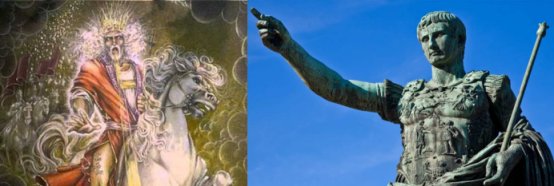 The two 'Good News' Motifs of the Messianic Scriptures
The two 'Good News' Motifs of the Messianic Scriptures
The use of Roman and Greek Symbols in the New Testament
One thing you have got to realise early on - and this is something messianics tend to miss because they're so obssessed with everything Hebrew and can't understand how anything non-Israelite could have any prophetic value - is that the Messianic Scriptures (New Testament) contain a lot of Roman and Greek symbols because of the political and cultural situation in the Middle East and Europe. As we'll see later, Paul uses Roman symbolism in his epistles - the soldier's armour of Ephesians 6, for example, being that of a Roman soldier of the time. This is why historical knowledge is of great importance to accurate exegesis (scriptural interpretation).
The Gospel as Shorthand for the Message of Salvation
For both Yah'shua (Jesus) and Paul the announcement of the breaking in of Elohim's (God's) Kingdom was both the fulfilment of prophecy and a challenge to the world's present rulers. So the word 'gospel' becomes a kind of shorthand for both the message of Yah'shua (Jesus) Himself and the apostolic message about Him. Paul saw this message as the vehicle of Yahweh's saving power (Rom.1:16; 1 Thes.2:13).
The Word as Gospel
One of the ways we can distinguish between authentic gospels (such as the four we have in the New Testament) and all the fake gospels that started circulating in the 2nd and later centuries), which tended to both cut off the scriptural and Hebraic roots of Yah'shua's (Jesus') achievement, is that the fake ones focussed on developping a private spirituality rather than challenging the wickedness of the present world's rulers, which is why the true Gospel provokes such hostility as it calls the governments and industrialists of this world to accountability. And since in Isaiah this creative, life-giving Good News was seen as Yahweh's own powerful Word (Is.40:8; 55:11), the early believers could use 'word' and 'message' as shorthand for the basic Messianic/Christian proclamation. So that's what is meant by 'Good News' or 'Gospel'.
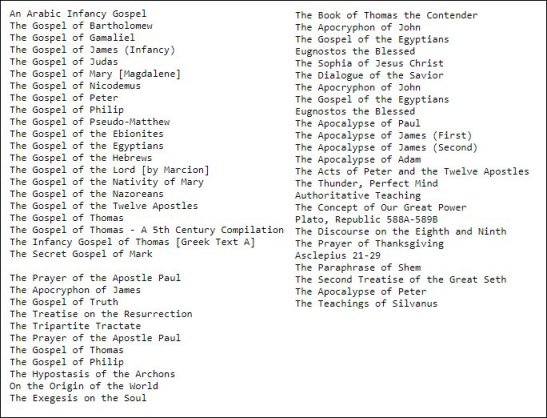 Just some of the dozens of fake 'gospels' created long after the originals
Just some of the dozens of fake 'gospels' created long after the originals
Yah'shua's Moment to Act
Back to the text. I mentioned to you in an earlier lesson, that Mark is an action gospel because his Roman audience appreciated that kind of narrative But there's more to it than that because there's a very real, live action in progress here too. It's like the Premiere of the Greatest Movie ever made. Yah'shua (Jesus) has carefully picked the moment to act. He didn't just pick Peter and the others randomly, nor did He do an 'eeny meeny miny moe' on a wall calendar and pick that day when He called them for the fun of it. As long as John was announcing the Kingdom at the River Jordan, Yah'shua (Jesus) could bide His time and carry on with His normal routine as a regular carpenter. But the moment He learns the news of John's arrest, as this passage begins with, He knows it is His time to pick up the baton, His cue to act. He packed up His trade too, as the nevi'im (prophets) in the past quit farming or whatever it was they regularly did when their calling came. All the Players, from the greatest to the least, respond with precision. The Story must proceed according to a prophetic timetable, key historical events must unfold breathtakingly rapidly, Yahweh is on the move, and nothing can stop Him!
The Time of Waiting
Like every servant of Yahweh, Yah'shua (Jesus) must have been praying and waiting on His Father Yahweh to know for certain when the right moment had arrived. There could be no margin for error. How did the Saviour know? The same way, I suppose, we all do - through situations and events, through the still small voice within, piercing the silence of quiet, contemplative prayer and fasting. And for all those servants of El Elyon (the Most High) with a high calling, they know there is a time to wait (sometimes for a very long time) and a moment to go public. This would begin a fresh moment of the Kingdom.
A Wandering Prophet in Galilee
So He came to the Galilean villages as a wandering navi (prophet) like the nevi'im (prophets) of old, unlike John who taught and preached in only one place, as many of us do too for now. And He had an urgent Message, complex yet simple - complex, because He would need to explain to the people what was going on and most of them would not understand - simple, because all they had to do was repent of their sins, trust in Him, realise that the Appointed Time that Israel had been waiting for had come that would forever change the world, and tell others about it.
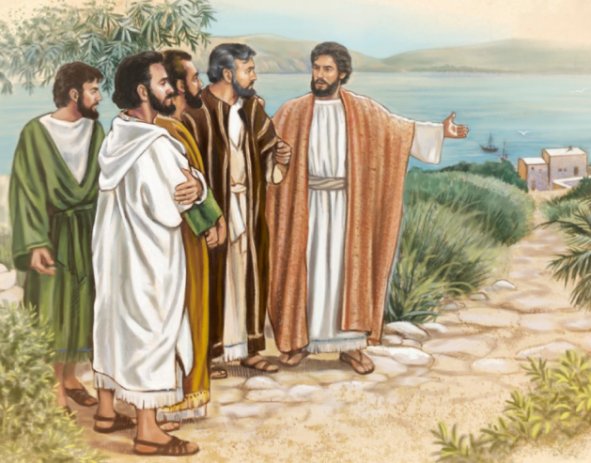 Yah'shua began His ministry as a wandering prophet in Galilee
Yah'shua began His ministry as a wandering prophet in Galilee
What Does 'Repent' Mean Today?
Now, I just used a word - 'repent' - whose meaning you, of course, well know. When I was young someone could have walked down the High Street of my home village, or indeed any town in England, crying, "Repent and believe the Gospel", and most people would have understood what was meant, because everyone had had a basic Christian education either at school or in Church. In my school we had 'Divinity' lessons in which we studied the New Testament using the New English Bible (NEB) and the latest 'J.B.Phillips' paraphrase, which is why I am rather fond of these two versions. They might have scoffed hearing me street-preaching like that had I done it (in those days it was common for people to go around with billboards saying, 'Repent! The end of the world is nigh!', or something like that) but they would have known what the message meant clearly enough. Most people in Britain, America, Australia or other Anglophone nations today would probably know of the existence of the word 'repent' but most would probably not understand what it means properly. After all, it's not a commonly used word outside the church.
The Time is Fulfilled
So when Yah'shua (Jesus) cried to the Yehudim (Judahites) 2,000 years ago, saying:
"The time is fulfilled, and the kingdom of Elohim (God) is at hand. Repent, and believe in the gospel" (Mark 1:15, NKJV),
they knew exactly what He meant back then.
Returning to Yahweh
They would have known they were being called to turn away from sin because Yahweh was about to intervene to put the world right at last. They would have understood that this would have been both a personal and a corporate, national call to 'turn back' from idolatry and to proper Yahweh worship. And they would have related this in their minds to a picture, long engrained into them every Pesach or Passover, that this call signalled the end of Exile - as it had for their forefathers and had led to the Egyptian Exodus, and as it had done for a later generation they returned home from Babylon. These historical recollections would have flooded their minds as Yah'shua (Jesus) intended them to. They would have known that if Israel were to return in every sense of the word, they would first and foremost have to return to Yahweh.
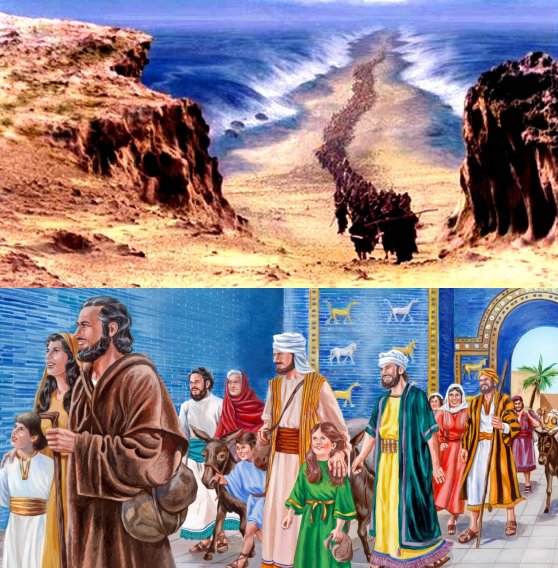 Two very familiar Exile and Return motifs Israelites would have known
Two very familiar Exile and Return motifs Israelites would have known
Imagining a Roman Response
Would a Roman listener, unacquainted with Israelite history, have understood? Not the details, no, but they would have got the general drift. They would have connected the dots without too much difficulty. They would have been in the national phronema, for one thing, and the Ruach (Spirit) would have gripped those ripe for salvation. Pagans would have understood enough. And I don't doubt some would have got converted even at this early stage of the Gospel presentation before even coming to the end of the first chapter. It's not every day the Heavens open and Deity speaks in such a dramatic way. The navi (prophet), John, had born witness in advance, and his prophecy had come true. So there was an important witness already.
'Drop Everything Immediately and Follow Me'
Now the Messiah's hour had come to speak and complete strangers were willing to drop everything and just go and follow Him. That doesn't happen very often. You don't abandon a family trade of generations, and leave your wife and children for long periods of time, on a whim. Did they even say goodbye? We're not told, but on another occasion, there is no mistaking what the Master expected:
"Then a certain Torah-teacher (scribe) came and said to Him, 'Teacher, I will follow You wherever You go.' And Yah'shua (Jesus) said to him, 'Foxes have holes and birds of the air have nests, but the Son of Man has nowhere to lay His head.' Then another of His talmidim (disciples) said to Him, 'Master, let me first go and bury my father.' But Yah'shua (Jesus) said to him, 'Follow Me, and let the [spiritually] dead bury their own [physical] dead'" (Matt.8:19-22, NKJV).
No Promises of Luxury for Authentic Disciples
You can judge from that the options those early talmidim (disciples) had. So this is radical - very radical - and I can think that a lot of people would balk at that, even accusing someone making such a demand as 'extremist'. He didn't promise them luxury cars, fancy hôtels, jet planes, expensive houses with swimming pools. Not remotely. He promised them homelessness, like Himself, with nowhere to lay their head - no place of domestic repose. Time was short. He was only to be among them a short while, though they weren't to know that then. They just knew that His demand was total as His in giving His life for them would one day be total, and indeed as He was already giving Himself totally as a navi (prophet) without a home. This kind of Gospel commitment doesn't exactly gel with the creature comforts and affluence of 21st century propserity preachers, does it?
Complete Submission
So this short verse 15 is telling the listeners and seekers of all generations to do the same, and they have. It's time to come out of Exile and return home to the Father's Kingdom, but first there must be authentic repentance from sin followed by complete submission to the King and His ways. There's no other way. Only these things can secure entrance into the Kingdom.
The Challenge to Us Today
How does this message translate to us today? In its simplest form, the message is simply, 'Repent and believe in the Besorah (Gospel) of Yah'shua the Messiah (Jesus Christ). Become a believer! But bearing in mind the connections a 1st century audience would have made, Yah'shua (Jesus) is also telling the 21st century convert to abandon the social and political agendas destroying his or her life and country. There has to be a separation. That's what holiness means. I'm sure you can think of half-a-dozen worldly agendas right off the bat. We are to unhesitatingly abandon all ideologies that are even right now driving half the population to violent behaviour. Look at our streets today. Back in Yah'shua's (Jesus') day the Zealots were driving the people to revolution. The Marxists, Anarchists, Corporate Capitalists, Ecofascists and others are doing the same today. And that means, practically, there has to be a complete change in loyalties. For Israel, at least (and that still applies to believers today), it means give full loyalty to Yahweh-Elohim because before that happens there can be no collective redemption of nations and (for believers) no return to the Promised Land - no Second Exodus, no Final Gathering.
He Wants to Make a Radical Change in Your Life
Yahweh wants to do something completely new in your life just as He did back then. He wants you to trust in the Good News, the Gospel of the King and the Kingdom. He wants to effect supernatural, radical change in you. But before that can happen, we have to cut ourselves loose from any competing ties and trust Him to see everything come together in the right way for our futures. It wasn't easy then for those first talmidim (disciples), as we shall discover from their life stories, and it isn't any easier now. But it's what Peter, Andrew, John, and James did, and it's what all true believers are called to do today, and tomorrow, and on into Yahweh's future.
Conclusion
As before, we have only covered a few verses but they have been important ones. Nothing worthwhile happens without commitment. There will be challenges in the days immedtaely ahead. Embrace them, wrestle with them as Jacob wrestled with the malak (angel), and don't let go until Yahweh gives you a blessing! Until next week, Yahweh bless you all in Yah'shua (Jesus). Amen.
Continued in Part 6
Acknowledgements
[1] Tom Wright, Mark for Everyone (SPCK, London: 2001)
[2] D.E.Nineham, The Gospel of St.Mark; The Pelican New Testament Commantaries (Penguin Books, Harmandsworth, Middlesex, England: 1972)
[3] J.C.Fenton, The Gospel According to John in the Revised Standard Version (OUP: 1979)
[4] J.R.Dummelow, The One Volume Bible Commentary (Macmillan, NY: 1975)
[5] Thomas M.Mumford, Horizontal Harmony of the Four Gospels in Parallel Columns (Deseret, SLC, Utah: 1982)
[6] Hugh Anderson, The New Century Bible Commentary: The Gospel of Mark (Eerdmans, Grand Rapids, Michigan: 1981)
[7] Ed. Gerhard Kittel, Theological Dictionary of the New Testament - 10 vols. (Eerdmans, Grand Rpids, Michigan: 1976)
[8] N.T.Wright, The New Testament and the People of God: Christian Origins and the Question of God (SPCK, London: 2013)
[9] N.T.Wright, How God Became King: The Forgotten Story of the Gospels (Harper One, NY: 2012)
[10] N.T.Wright, Jesus and the Victory of God (SPCK, London: 1996)
[11] N.T.Wright, The Resurrection of the Son of God (SPCK, London: 2003)
[12] N.T.Wright, The Challenge of Jesus: Rediscovering Who Jesus was and Is (IVP Academic, Downers Grove, Illinois: 1999)
[13] Rev.Prof.F.Davidson (ed.), The New Bible Commentary (Inter-Varsity press, London: 1953)

 V138
V138
|


